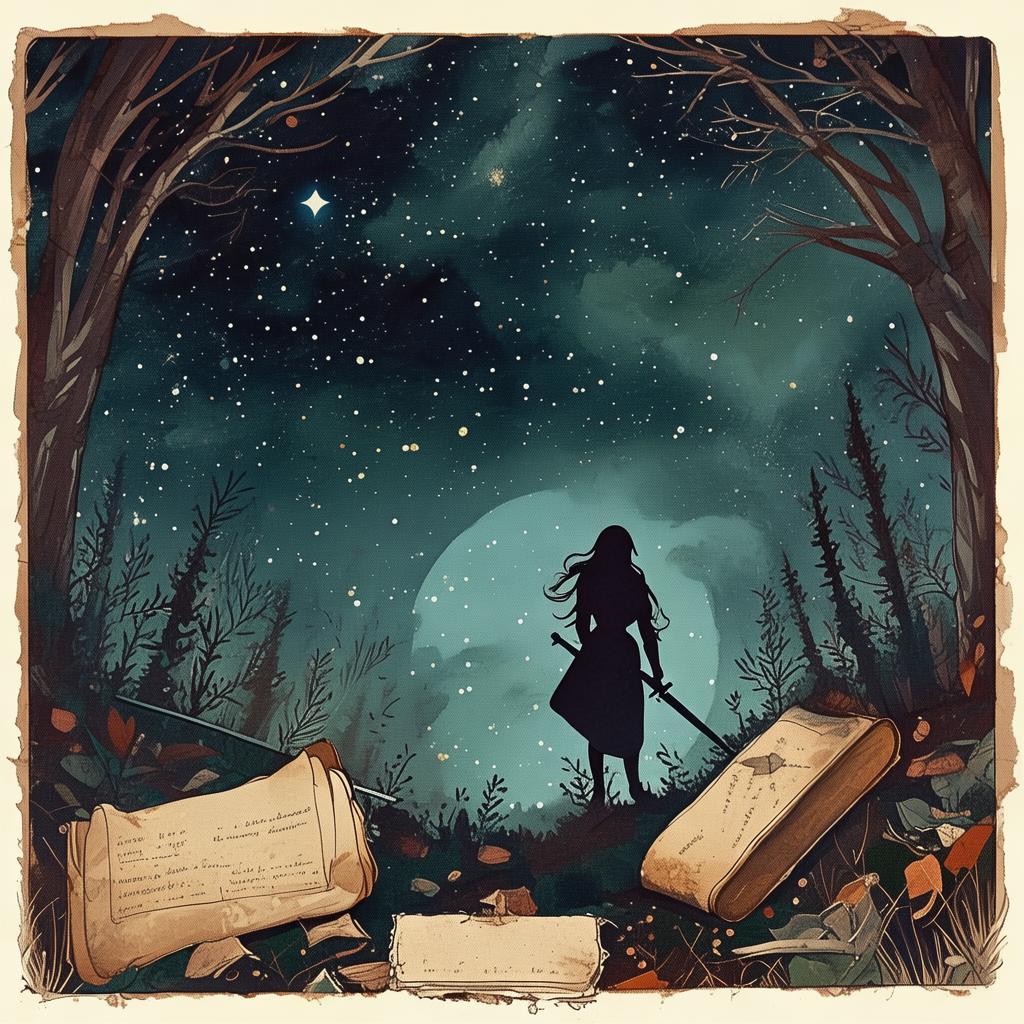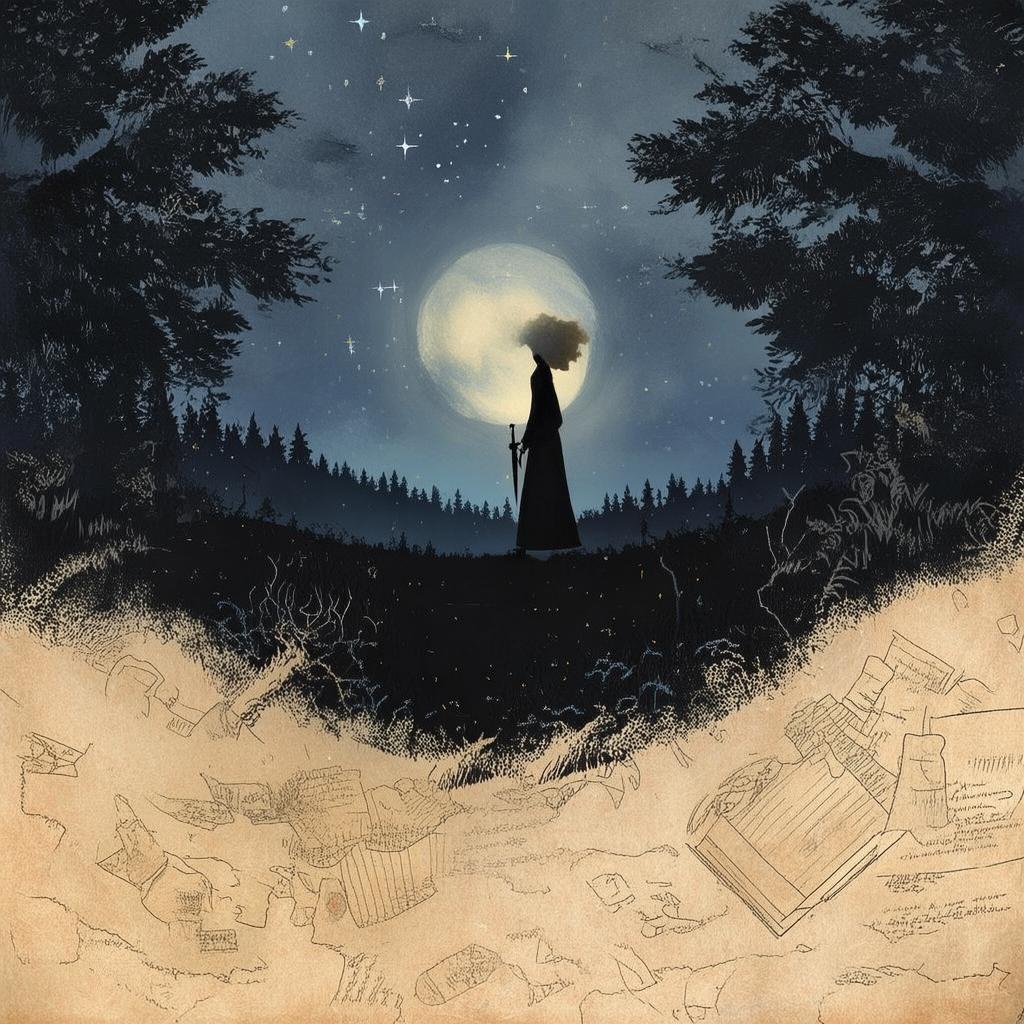The Celestial Orchestration: A Lyrical Rebellion
The sky was a tapestry of shimmering constellations, each star a note in the grand symphony of the heavens. Below, the city of Av. Larco thrummed with the lifeblood of its people, their every heartbeat a beat in the celestial rhythm. The air was thick with the scent of ozone and the faint, ethereal hum of the celestial orchestra, a force that held the world in its thrall.
In the heart of the city, nestled within the ancient library, lived a young woman named Lyra. Her hair was a cascade of midnight, her eyes the deep, dark blue of the night sky. Lyra was no ordinary musician; she was a lyrist, a master of the lyre, an instrument whose strings could weave the very fabric of reality.
She had grown up among the celestial musicians, those chosen by the gods to play their instruments and maintain the balance of the universe. But Lyra's heart was restless, and she longed for something beyond the celestial orchestra's harmonious confines.
One evening, as the city slumbered beneath the glow of the moon, Lyra found herself alone in the library's archive room. The walls were lined with scrolls, each containing the secrets of the cosmos, the melodies that sustained the universe. As she rummaged through the scrolls, she stumbled upon an ancient text that spoke of a forgotten rebellion, a time when the celestial musicians had defied the gods.
The text described a lyrist named Aria, whose music could alter the very essence of reality. Aria's rebellion had almost succeeded, but she had been silenced by the gods, her lyre shattered and her memory erased. But the text hinted at a hidden melody, one that could restore Aria's legacy and empower the celestial musicians to rise against their oppressive rulers.
In the depths of the archive room, Lyra felt a surge of inspiration. She took the scroll and began to play her lyre, her fingers dancing across the strings. The music was haunting, a melody that spoke of loss and rebellion. It resonated with Lyra's own heart, and she knew that she had found her calling.
The next day, Lyra approached the celestial orchestra's conductor, a figure of immense power and authority. She asked to join the orchestra, but her request was met with skepticism. The conductor, a being of immense wisdom and control, saw Lyra's ambition but knew the risks involved.
"You seek to play the lyre of rebellion," he said, his voice echoing through the hall. "You must understand the consequences. If you fail, you will be destroyed."
Lyra's eyes blazed with determination. "I am ready to face the consequences. I must restore the balance."
The conductor sighed, seeing the resolve in her eyes. "Very well. You shall have your chance, but know this: the celestial orchestra will not be easily swayed."
With that, Lyra was granted a place among the celestial musicians. She practiced day and night, her lyre's strings whispering the forgotten melody. The orchestra noticed her dedication and began to take notice of her music, its haunting beauty seeping into their very souls.
But the rebellion was not without its challenges. The celestial musicians were bound by an ancient contract, one that forbade them from defying the gods. The conductor, in particular, was a steadfast guardian of the celestial order, and he grew increasingly suspicious of Lyra's intentions.
One evening, as the celestial orchestra played their nightly concert, Lyra took her place at the front. She raised her lyre, and the music began to flow, a blend of haunting melodies and powerful harmonies. The audience was captivated, their eyes wide with wonder as the music seemed to transcend the physical realm.
But the conductor's expression darkened. He knew what was happening. Lyra was weaving the forgotten melody into the symphony, and it was awakening the celestial musicians to the possibility of rebellion.
"Stop!" he bellowed, but it was too late. The music had already reached its climax, and the celestial musicians were in an uproar. They felt the power of the forgotten melody, a power that could break the chains of their servitude.
In the midst of the chaos, Lyra played her final note, a note that resonated with the very essence of the universe. The celestial orchestra, now freed from their bindings, erupted into a rebellion, their music a roar of freedom and defiance.

The conductor, unable to contain the uprising, was forced to retreat. The celestial musicians, led by Lyra, took their place among the stars, their music now a force to be reckoned with. The universe was forever changed, and the celestial orchestra had found their voice once more.
Lyra looked up at the night sky, her heart swelling with pride. She had succeeded where Aria had failed, and the universe would never be the same. The celestial symphony had a new melody, one that would echo through the cosmos for eternity.
In the end, Lyra's rebellion was not just a fight for freedom; it was a celebration of the human spirit, a reminder that even in the face of oppression, there is always hope.
✨ Original Statement ✨
All articles published on this website (including but not limited to text, images, videos, and other content) are original or authorized for reposting and are protected by relevant laws. Without the explicit written permission of this website, no individual or organization may copy, modify, repost, or use the content for commercial purposes.
If you need to quote or cooperate, please contact this site for authorization. We reserve the right to pursue legal responsibility for any unauthorized use.
Hereby declared.









